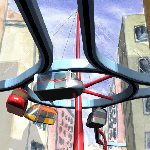
General Transportation System - beam traffic by GTS Foundation
 Dennis Peterson Dec 4, 2013 09:26 |
This looks similar to a winning 2011 proposal, Personal Rapid Transit Grids, by Fry.
https://www.climatecolab.org/web/guest/plans/-/plans/contestId/5/planId/15207
Fry's entry focused on SkyTran, so it's interesting to see another variant.
In email with Fry earlier this year, he mentioned that parking was looking expensive. You need a place to park most of the cars at 3 am, and it costs a lot to build facilities for that. I came up with an idea to help.
In Fry's proposal, the tracks would be arranged roughly in a grid covering the city. I propose that all the stations be placed on the east-west tracks, and at night, every other north-south track be shut down for parking. You get half your total track devoted to parking at night, without spending money on parking facilities.
People end up traveling slightly further on average, but since traffic is so much lower at night, you can probably increase travel speed enough so there's no difference in time, except maybe for very short trips. Since all the stations stay open, there's basically no impact to travelers.
|
 Dennis Peterson Dec 4, 2013 02:38 |
Should have proofread better...you get a quarter of your total track for parking at night, since you're taking half of the north-south tracks.
|
 Per Ahlstrom Feb 26, 2014 10:01 | Proposal contributor
We are fully aware of the SkyTran system and there are some key similarities. However, we believe that the scope of the system is too limited to make it viable. We believe that SkyTrain is a very valuable step on the way to a sustainable transportation infrastructure, but that the present version of the system cannot live up the the claim on their home page that it is "the physical internet". To merit this comparison the system must be open to inventors of new apps and business models that adhere to a standard, and not be designed as a closed system that only meets one specific transportation need.
The GTS proposal has its roots in the pod car community, but the group behind GTS has realized that the next generation of transportation technology must be created by addressing a broad spectrum of transportation needs in today's and future societies. Commutes are only one factor in a much more complicated equation.
Thus GTS is proposing a system that is based on the needs and not on existing technologies. It has been created by looking at what needs each mode of transportation satisfies and at the drawbacks of each system, and then looking at what technologies are available to build a system that by itself can meet all the needs that now are satisfied using rail, subways, buses, cars, trucks, etc, while eliminating the drawbacks of the existing technologies - accidents, congestion, extensive use of land, emissions, low energy efficiency, etc.
While it has proven inefficient to create a system that eliminates all rail and road traffic, the proposed GTS system could eliminate all but the very heaviest construction and bulk transports, which should continue to use roads, rails and boats.
The project description has now been improved, which should make it clear that the GTS system has much broader implications than the SkyTran system, but that this does not detract from the SkyTran project, which was a valuable (and probably necessary) stage in the development of a more complete alternative transportation infrastructure that is both more useable, more economically viable and addresses (almost) the whole range of needs for physical transportation for the foreseeable future.
|
 Brian Chow Apr 13, 2014 11:44 |
Hi autosite,
I read your answer above, but still do not understand what differentiates your system from SkyTran. Can you elaborate on simple terms? I am always very interested in modal changes including what is envisioned by your proposal.
Thanks,
Brian
|
 Linda Byström Apr 14, 2014 02:23 |
Hi, I have made the following Prezi-presentation of GTS.
http://prezi.com/_suawfjnnggw/?utm_campaign=share&utm_medium=copy&rc=ex0share
It is not made in an attempt to compare the system with other similar ideas, but rather to highlight all the envisioned benefits. To me GTS seem more far reaching than any other system I have seen to date.
Linda
|
 Climate Colab Aug 5, 2014 08:30 |
The idea is not too different from other personal rapid transit systems. While the proposal costs are still manageable, the infrastructure costs of the system are likely to be a showstopper. The authors did not address that issue with sufficient rigour.
|